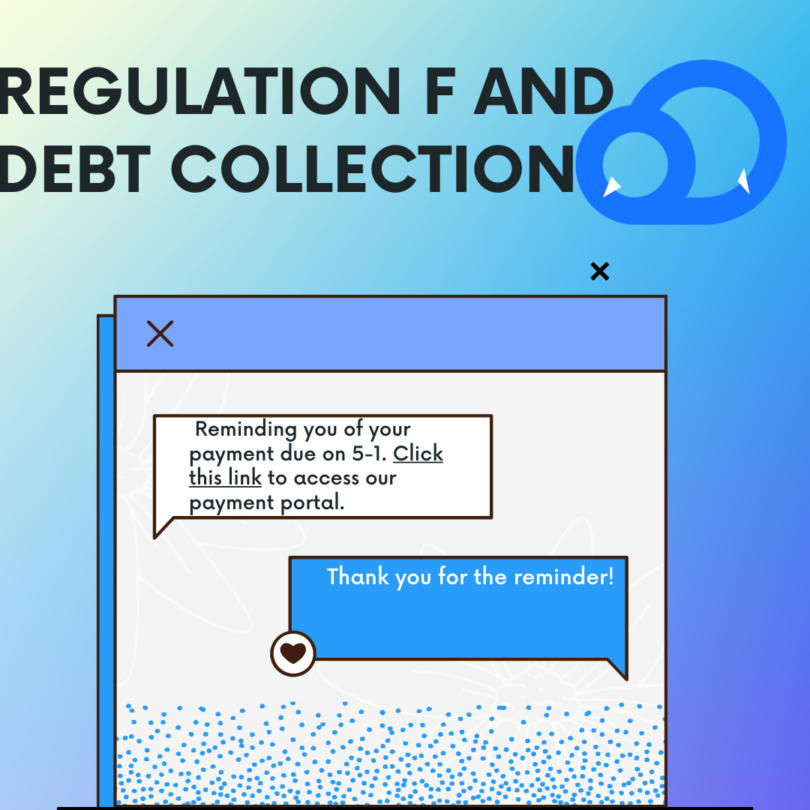SMS and Debt Collection
In our fast-paced world, communication methods have evolved significantly, impacting various industries, including debt collection. One prominent form of communication utilized by debt collectors is SMS or text messaging. However, to ensure fair and responsible practices, the Consumer Financial Protection Bureau (CFPB) introduced Regulation F, which outlines specific rules and guidelines for debt collection, including SMS communication. In this blog post, we will delve into the details of Regulation F and its implications for debt collection through SMS.
It is also important to note that SMS communication can be received on any mobile phone, whether it is a smartphone or not, and does not rely on an internet connection. This universal accessibility ensures that messages reach a wider audience, increasing the chances of successful debt recovery.
DISCLAIMER: The information provided in this blog post is for informational purposes only and should not be considered legal advice. Readers are encouraged to conduct their own research and consult with legal professionals to ensure compliance with applicable laws and regulations before engaging in debt collection practices. The laws and regulations governing debt collection may vary by jurisdiction, and it is essential to understand and follow the specific legal requirements in the relevant jurisdiction. The author and publisher of this blog post disclaim any liability for actions taken based on the information provided herein.
What is Regulation F?
Regulation F is a set of rules and guidelines established by the CFPB, a U.S. government agency responsible for consumer protection in the financial sector. The CFPB designed Regulation F to implement the Fair Debt Collection Practices Act (FDCPA) amendments, aiming to address concerns and issues surrounding debt collection practices.
The primary objective of Regulation F is to protect consumers from unfair, deceptive, or abusive debt collection practices. It provides clarity and sets forth specific requirements for debt collectors to ensure they engage in ethical and responsible practices when communicating with consumers.
Try Our Premium SMS Platform for Free!
Ready to take advantage of the many benefits that SMS (text messaging) has to offer?
Sign up for our 14-day free trial today to start boosting engagement, increasing open-rates, and making sales. Do more with CloudContactAI.
Regulation F and SMS Communication
One crucial aspect of debt collection in today’s digital era is the use of SMS or text messaging. Debt collectors often rely on SMS or text messaging as a vital tool for reaching out to consumers promptly. The effectiveness of SMS in debt collection is notable due to several key factors. Firstly, the open rates for SMS are remarkably high, with 98% of texts being opened, compared to a much lower average open rate for emails. This ensures that messages are almost always seen by the recipient. Additionally, texts are read quickly, with 90% of them being read within three minutes of receipt, facilitating faster responses and potentially quicker payments.
Another significant advantage of using SMS in debt collection is the efficiency it offers. Using an SMS service, debt collectors can send messages to all their debtor customers simultaneously, rather than having to call each one individually. This not only saves time but also increases the productivity of the collection process. Moreover, SMS is accessible on any mobile phone, whether it is a smartphone or not, and does not rely on Wi-Fi, which broadens the reach of these communications.
Under Regulation F, debt collectors must comply with the following guidelines when engaging in SMS communication:
Consent
Debt collectors must obtain the consumer’s consent to communicate through SMS. This consent can be obtained orally or in writing, and it must be voluntary and not coerced.
Limited Contact
Debt collectors must adhere to limitations on the frequency of SMS communications. Regulation F specifies that debt collectors should not send more than seven text messages within a seven-day period to a consumer regarding a particular debt.
Opt-out Mechanism
Consumers must have the option to opt-out of receiving SMS messages at any time. Debt collectors must provide a simple and straightforward opt-out method, such as replying with a specific keyword or by contacting the debt collector directly.
Identifying Information
Debt collectors must clearly identify themselves in SMS messages, including their identity as a debt collector and information on how the consumer can identify the original creditor and the amount owed.
Prohibited Content
SMS messages must not contain false, misleading, or deceptive information. Debt collectors are prohibited from using threats, profanity, or engaging in any harassing behavior.
Time Restrictions
Debt collectors should not send SMS messages to consumers outside the hours of 8 a.m. to 9 p.m. in the consumer’s local time zone unless the consumer agrees to communicate during alternative hours.

Benefits and Challenges of Regulation F in SMS Debt Collection
The introduction of Regulation F in SMS debt collection has both benefits and challenges for consumers and debt collectors alike.
Benefits:
Consumer Protection: Regulation F aims to protect consumers from abusive and harassing debt collection practices, ensuring they are treated fairly and respectfully.
Transparency: By requiring debt collectors to clearly identify themselves and provide accurate information, consumers can better understand the nature of their debts and make informed decisions.
Opt-out Option: The provision of an opt-out mechanism empowers consumers to control their communication preferences, providing a sense of autonomy.
Challenges:
Compliance Burden: Debt collectors need to invest time and resources to ensure compliance with Regulation F. They must implement systems to track and monitor SMS communications and manage opt-out requests effectively.
Communication Efficiency: The limitations on SMS frequency and time restrictions may pose challenges for debt collectors in promptly communicating with consumers.
Timely Reminders: Sending an SMS on the customer’s payment due date has been shown to prompt immediate payments. Follow-up reminders can be scheduled a week before and a couple of days before the due date, with a final reminder following the due date if necessary.
Concise Communication: Including the amount owed and clear payment instructions within the text can motivate customers to settle their debts. Directing them to an online payment portal simplifies the payment process.
Integrated Systems: Automating these reminders and integrating the SMS system with existing CRM platforms can streamline the process, making it efficient and less prone to error.
Conclusion
Regulation F has introduced important guidelines for debt collectors engaging in SMS communication with consumers. While it aims to protect consumers from abusive debt collection practices, it also poses challenges for debt collectors. Striking a balance between compliance and efficient communication, investing in technology and training, maintaining consumer engagement, and staying updated with regulatory changes are critical for debt collectors to navigate the intricacies of Regulation F successfully.
By adhering to the guidelines set forth in Regulation F, debt collectors can establish trust, promote responsible debt collection practices, and ensure fair treatment of consumers throughout the SMS communication process. Ultimately, the effective implementation of Regulation F benefits both consumers and debt collectors by fostering a transparent and respectful debt collection environment.
Not sure if you’re ready to revolutionize the way your business communicates? Sign up for our 14-day free trial!
What do you have to lose?





